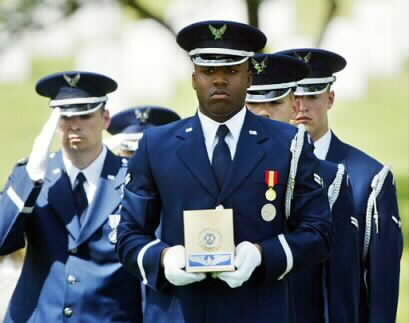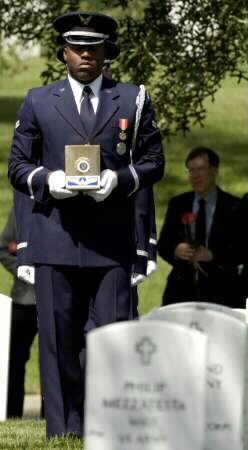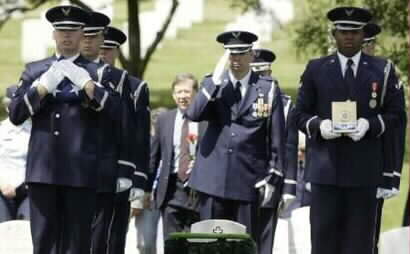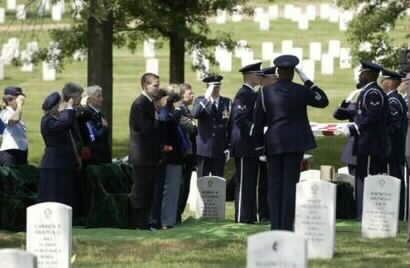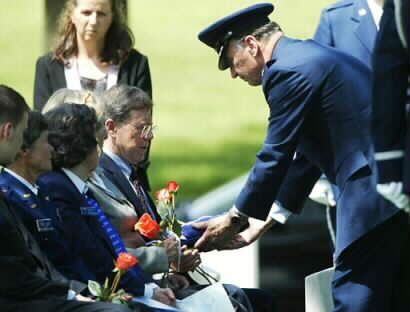Elizabeth Magid, who flew planes for the U.S. military during World War II and whose poem “Celestial Flight” became a fixture at funerals for female pilots, died in Denver, Colorado, March 23, 2004, of cancer, her son said. She was 86.
She wrote “Celestial Flight” in memory of her best friend and fellow pilot Marie Michell Robinson, who was killed in the crash of a B-25.
Elizabeth Magid, also known as “Kit,” was among 1,074 women who became pilots in the short-lived program Women Airforce Service Pilots. She was assigned to ferry planes, some that were damaged.
Her son said one of her favorite memories was the time she and a WASP classmate ferried two planes that were going to be used for parts.
“We were flying side-by-side, and nuts and bolts were literally popping off and flying by. All we did was hold our thumbs up and say, ‘We’re still here!’ As long as she was giving me that sign, we knew we were OK,” she told her son.
Elizabeth MacKethan Magid and Marie Michell Robinson entered the September, 1943 class for training in the Women Airforce Service Pilots (WASP) during World War II. While undergoing training at Avenger Field, Sweetwater, Texas, they became very close friends. They exchanged a promise that if anything ever happened to one, the other would go to be with the bereaved mother, never really believing this promise would have to be kept.
After graduation from flight school in 1944, Elizabeth and Marie were stationed together as ferry pilots with the Air Transport Command, Love Field, Dallas, Texas. Later Elizabeth was sent to Cochran Field, Georgia, where she flew overhauled basic and advanced trainers. Marie was sent to Victorville Air Force Base, California, where she flew twin-engine bombers. In October, 1944, Marie was killed in the crash of a B-25. She was nineteen years of age.
While waiting for transportation to Michigan for a Memorial Service for Marie, Elizabeth completed her test flying duties for the day. As she soared upward amidst the soft fair weather cumulus clouds, she fantasized that her friend was there. She recalled the happy days training when she, Marie and sky were one — on playful silver wings. But Marie was not there. Elizabeth landed and in a secluded spot in the Operations Room she penned “Celestial Flight” in words that seemed to come from a Source other than herself.
As soon as possible Elizabeth caught military flights to Michigan and shared the words of the poem with Marie’s mother, thus fulfilling the promise exchanged many months before at a dusty, windswept training field in Texas.
She is not dead –
But only flying higher,
Higher than she’s flown before,
And earthly limitations
Will hinder her no more.
There is no service ceiling,
Or any fuel range,
And there is no anoxia,
Or need for engine change.
Thank God that now her flight can be
To heights her eyes had scanned,
Where she can race with comets,
And buzz the rainbow’s span.
For she is universal
Like courage, love and hope,
And all free, sweet emotions
Of vast and godly scope.
And understand a pilot’s Fate
Is not the thing she fears,
But rather sadness left behind,
Your heartbreak and your tears.
So all you loved ones, dry your eyes,
Yes, it is wrong that you should grieve,
For she would love your courage more,
And she would want you to believe
She is not dead.
You should have known
That she is only flying higher,
Higher than she’s ever flown.
Elizabeth MacKethan Magid
In memory of her fellow WASP
Marie Michell Robinson
The urn containing the ashes of veteran Women Airforce Service Pilot Elizabeth
Magid, is carried by Airman First Class Keith Robinson during a funeral ceremony at
Arlington National Cemetery, Tuesday, May 26, 2004. Magid, whose poem ‘Celestial Flight’
became a fixture at funerals for female pilots, died March 23, 2004, of cancer at age 86.
Elizabeth Magid flew planes for the U.S. military during World War II
U.S. Air Force Honor Guardsmen Airmen First Class Keith Wilkinson carries
the golden urn with the remains of World War II veteran Elizabeth Magid
during standard Air Force Honors service at Arlington National Cemetery
May 26, 2004. Magid, 86, ferried planes during World War II as a pilot with the
WASPS, the Women Airforce Service Pilots.
U.S. Air Force Honor Guardsmen carry a flag and the golden urn with the remains of
World War II veteran Elizabeth Magid during a standard Air Force honors service at
Arlington National Cemetery, May 26, 2004.
A standard Air Force honors service for U.S. World War II veteran Elizabeth Magid
is held at Arlington National Cemetery, May 26, 2004.
Ken Magid, center, son of veteran Women Airforce Service Pilot Elizabeth Magid,
receives the American flag from Chaplain David Broyles, right, during a funeral ceremony
at Arlington National Cemetery, Tuesday, May 26, 2004.
Michael Robert Patterson was born in Arlington and is the son of a former officer of the US Army. So it was no wonder that sooner or later his interests drew him to American history and especially to American military history. Many of his articles can be found on renowned portals like the New York Times, Washingtonpost or Wikipedia.
Reviewed by: Michael Howard

